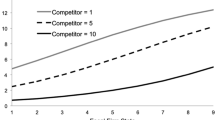Abstract
This paper investigates the effects of exogenous entry on market performance, and the profitability and welfare effects of horizontal mergers in symmetric Cournot oligopolies with firm-specific network effects. With strategic substitutes in the Cournot part of the model, per-firm output is declining in the number of firms, but industry output, price, per-firm profit, consumer surplus and social welfare may go either way in response to entry. We identify respective sufficient conditions for each possibility. The counter-intuitive conclusions tend to require strong network effects. We study the scope for profitability of mergers and the associated welfare effects. In a general analysis, we provide a sufficient condition on inverse demand for a merger to be profitable, which amounts to requiring strong network effects. Under the condition that leads to higher industry output with entry, mergers are always social welfare-enhancing.
Similar content being viewed by others
References
Amir, R.: Cournot oligopoly and the theory of supermodular games. Games Econ. Behav. 15, 132–148 (1996)
Amir, R., Lambson, V.E.: On the effects of entry in Cournot markets. Rev. Econ. Stud. 67, 235–254 (2000)
Amir, R., Lazzati, N.: Network effects, market structure and industry performance. J. Econ. Theory 146, 2389–2419 (2011)
Amir, R., De Castro, L., Koutsougeras, L.: Free entry versus socially optimal entry. J. Econ. Theory 154, 112–125 (2014)
Amir, R., Evstigneev, I., Gama, A.: Oligopoly with network effects: firm-specific versus single network. Econ. Theor. (2019). https://doi.org/10.1007/s00199-019-01229-0
Balbus, Ł., Dziewulski, P., Reffett, K., Woźny, Ł.: A qualitative theory of large games with strategic complementarities. Econ. Theor. 67, 497–523 (2019)
Barthel, A.C., Hoffmann, E.: Rationalizability and learning in games with strategic heterogeneity. Econ. Theor. 67, 565–587 (2019)
Boyarchenko, S.: Super- and submodularity of stopping games with random observations. Econ. Theory (2019). https://doi.org/10.1007/s00199-019-01198-4
Brandenburger, A., Nalebuff, B.: Co-opetition. Doubleday, New York (1996)
Brécard, D.: Environmental quality competition and taxation in the presence of green network effect among consumers. Environ. Resour. Econ. 54, 1–19 (2013)
Church, J., Gandal, N.: Network effects, software provision, and standardization. J. Ind. Econ. 40, 85–103 (1992)
Crémer, J., Rey, P., Tirole, J.: Connectivity in the commercial Internet. J. Ind. Econ. 48, 433–472 (2000)
Cusumano, M.A., Mylonadis, Y., Rosenbloom, R.S.: Strategic maneuvering and mass-market dynamics: the triumph of VHS over beta. Bus. Hist. Rev. 66, 51–94 (1992)
Echenique, F.: Comparative statics by adaptive dynamics and the correspondence principle. Econometrica 70, 833–844 (2002)
Economides, N., Himmelberg, C.: Critical mass and network evolution in telecommunications. Toward a Competitive Telecommunication Industry. Gerald W. Brock (ed.), 47-66 (1995)
Economides, N.: Network externalities, complementarities, and invitations to enter. Eur. J. Polit. Econ. 12(2), 211–233 (1996)
Farrell, J., Klemperer, P.: Coordination and Lockin: Competition with Switching Costs and Network Effects. Handbook of Industrial Organization, vol. 3, pp. 1967–2072. Elsevier, Amsterdam (2007)
Faulí-Oller, R.: On merger profitability in a Cournot setting. Econ. Lett 54, 75–79 (1997)
Faulí-Oller, R.: Mergers between asymmetric firms: profitability and welfare. Manchest. Sch. 70, 77–87 (2002)
Garcia, F., Vergari, C.: Revealing incentives for compatibility provision in vertically differentiated network industries. J. Econ. Manag. Strategy 25, 720–749 (2015)
Greaker, M., Midttømme, K.: Network effects and environmental externalities: do clean technologies suffer from excess inertia? J. Public Econ. 143, 27–38 (2016)
Guimaraes, B., Pereira, A.E.: QWERTY is efficient. J. Econ. Theory 163, 819–825 (2016)
Guimaraes, B., Machado, C., Pereira, A.E.: Dynamic coordination with timing frictions: theory and applications. J. Public Econ. Theory 22, 656–697 (2020)
Jiménez-Martínez, A.: Discrimination through versioning with advertising in social networks. Econ. Theor. 67, 525–564 (2019)
Katz, M.L., Shapiro, C.: Network externalities, competition and compatibility. Am. Econ. Rev. 75, 424–440 (1985)
Katz, M.L., Shapiro, C.: Technology adoption in the presence or network externalities. J. Polit. Econ. 94, 822–841 (1986)
Laussel, D., Resende, J.: Dynamic price competition in aftermarkets with network effects. J. Math. Econ. 50, 106–118 (2014)
Leibenstein, H.: Bandwagon, snob, and Veblen effects in the theory of consumers’ demand. Quart. J. Econ. 64, 183–207 (1950)
Liebowitz, J., Margolis, S.: Network externality: an uncommon tragedy. J. Econ. Perspect. 8, 133–150 (1994)
Milgrom, P., Roberts, J.: Rationalizability, learning and equilibrium in games with strategic complementarities. Econometrica 58, 1255–1278 (1990)
Milgrom, P., Roberts, J.: Comparing equilibria. The American Economic Review, pp 441–459 (1994)
Rohlfs, J.: A theory of interdependent demand for a communications service. Bell J. Econ. Manag. Sci. 5, 16–37 (1974)
Rohlfs, J.: Bandwagon Effects in High-Technology Industries. The MIT Press, Cambridge (2003)
Salant, S., Switzer, S., Reynolds, R.: Losses from horizontal merger: the effects of an exogenous change in industry structure on Cournot-Nash equilibrium. Q. J. Econ. 98, 185–199 (1983)
Samuelson, P.: Complementarity. J. Econ. Lit. 12, 1255–1289 (1974)
Shapiro, C., Varian, H.R.: Information Rules: A Strategic Guide to the Network Economy. Harvard Business School Press, Boston (1998)
Shy, O.: The Economics of Network Industries. Cambridge University Press, Cambridge (2001)
Topkis, D.: Supermodularity and Complementarity. Princeton University Press, Princeton (1998)
Veblen, T.B.: The Theory of the Leisure Class. Macmillan, London (1899)
Vives, X.: Nash equilibrium with strategic complementarities. J. Math. Econ. 19, 305–321 (1990)
Vives, X.: Oligopoly Pricing: Old Ideas and New Tools. The MIT Press, Cambridge (1999)
Author information
Authors and Affiliations
Corresponding author
Additional information
Publisher's Note
Springer Nature remains neutral with regard to jurisdictional claims in published maps and institutional affiliations.
Rights and permissions
About this article
Cite this article
Gama, A., Lahmandi-Ayed, R. & Pereira, A.E. Entry and mergers in oligopoly with firm-specific network effects. Econ Theory 70, 1139–1164 (2020). https://doi.org/10.1007/s00199-020-01316-7
Received:
Accepted:
Published:
Issue Date:
DOI: https://doi.org/10.1007/s00199-020-01316-7



